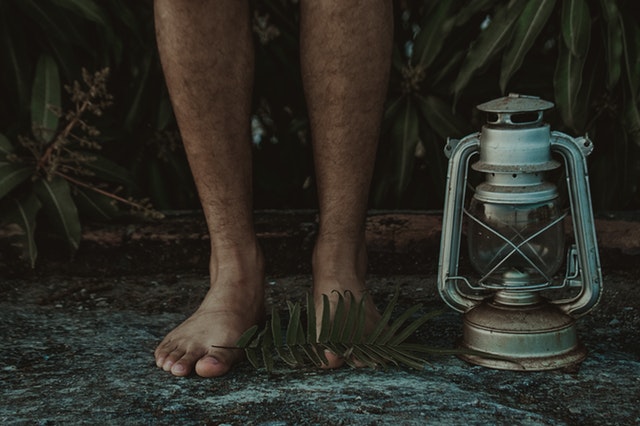This true story took place in 1994 in Greece while I was a visiting professor at the University of Crete in Iraklion.
It was a beautiful day. The sky was a bright Mediterranean blue and I had already prepared my notes for my afternoon chemistry class.
The previous weekend, we had been in Argiroupoli, and again, I had spent time looking around in the basement of my family’s village house and finding precious objects, bringing back to me all those sweet unforgettable childhood memories. There in a corner, I had found the acetylene lamp made of bronze that my father used to turn on every night to be able to do his work as a shoemaker. «Whoosh, whoosh, whoosh» … I remembered him pumping air into the kerosene container of the loux (Coleman) lantern and slowly, the familiar continuous noise … «shshshshshsh»… would increase in intensity, as did the brightness. It was clothed in at least 30 years of dust, but after proper cleaning, it looked like new.
To make it work, I would have to find quite a few parts. I had brought it to Chania while we were living there for a while, but I could not find every missing part. Then I had brought it to Rethymno, my hometown, and while downtown, I had discovered a beautiful Cretan character, whose spontaneous response to my predicament I cannot forget. He looked at it while I was holding it and exclaimed in his pure ancient Cretan dialect, “What the devil is wrong with it?!” Well, he could not fix it either because he did not have the parts. And so I had brought it to Iraklion with the hope that by taking it to a larger city, I might be lucky enough to see it working again.
I thought today was a good day to be outside, so I decided to take it downtown to see if I would be lucky this time. This day was like any other day, sitting in the bus watching the city go by, until I found myself walking in downtown Iraklion. But little did I know that today I would learn something that I had never thought of before.
There at the side of the road was a young man, about twenty years old, sitting on the ground begging for help. People were passing by in a hurry. Some of them would throw a few drachmas in his basket, while some others were more considerate and more patient, bending down and placing the coins gently. The majority just ignored the scene, moving on with their chores. I stood from afar watching as all this was happening. I felt compassion for him and I decided to approach him. Standing next to him, I realized that his body was completely deformed from birth. I had no intention of putting anything in his basket. I just wanted to talk with him. At that moment a thought came to me. What would my colleagues and students think if they saw me talking with a beggar? Didn’t I have something better to do? Write a new chemistry book? Correct papers?
My desire to talk with him became irresistible and I felt the urgency to experience his pain and thoughts. All other thoughts vanished like a cloud blown away by a mighty wind. By conversing with him, I found out that he was from northern Greece and that he had come to Crete with his mother because it was easier to make ends meet here. He had to drag his body on the ground to reach the bus station in order to go home. His mother was cleaning houses in the city all day long. He told me that the police would often tell him to move to a different sidewalk. He could not choose his place. He said he could understand that because many people were complaining to the police that his presence there was not good for the tourism industry. Many policemen were very gentle, he said, but some of them were very harsh and demanding. Some of them had even struck and threatened him.
This fellow had a childlike heart. He had a religious character, believing in many traditions that I would consider preposterous, but underneath I could see a pure heart with no anger, no anxiety, and no bitterness resulting from his situation or for any other reason. In a world full of people with whole bodies but with crippled spirits and minds, I thought what a marvelous thing it was that here was a man with a deformed body, if you could even call it a body, with tranquility and wisdom abiding in him.
As the discussion went on, all thoughts about who might be watching me had disappeared. I felt like inviting him to have lunch with me. I proposed that we go to a restaurant across the street to dine. I was not interested anymore in who would see me. At my suggestion, he reached in his basket, took some drachmas, and put them into my hand. “Today,” he said, “I will buy you lunch. (Tha se keraso, in Greek).” I was stunned. I did not know what to say for a moment.
I collected my thoughts and murmured, “No, no, I will pay for it.” At the same instant a thought came to my mind, “Here I am in the center of downtown Iraklion, the chemistry professor known by hundreds of students and dozens of professors, and I am taking money from a street beggar to buy my lunch? Money that others had put in his basket for him a few minutes ago.” Eternity rolled through my mind and I wished there were no time in existence.
Looking at him again, I felt as though he was my brother and I could feel his desire. His desire was to pay for our lunch and for us to enjoy it together, right there, in companionship on the sidewalk, in public with me, the chemistry teacher with a clear mind, the scientist who could have just put a few drachmas in his basket and be done with it immediately. He had no worries about what my acquaintances might say the next day at the university or what my relatives in Rethymno would say the next weekend if they had seen me.
I looked at him. He had a childlike smile on his face, trusting that I would comply with his request. I could clearly see that what he really wanted more than coins was some human companionship, just like all the people walking by him. Instead he had been despised and ignored by most passers-by as some sort of outcast. I could not wait any longer. I instantly felt his joy and I couldn’t wait to walk across the street to fulfill his request.
I felt so lucky to have been able to have such a revelation that day. He was a true gift to my life. The words of my model teacher at that time, Mahatma Gandhi, became so real to me: “To give pleasure to a single heart by a single act is better than a thousand heads bowing in prayer.” The silent teacher within me had taught me a new lesson once again: “Sometimes it is better to receive than to give”.
If you are a student living on a campus, have you ever considered how lonely other students feel, especially first year students? Have you tried to reduce their pain? You might say, “How can I do it when I myself feel that way?”. Our culture and education today is not encouraging us to think of others, but only about ourselves. We are taught how to develop our lives from the outside but as Sri Mata Amritanandamayi, chancellor of AMRITA University says, “Real life is developed from within. Real living means that the soul expresses itself through all one’s thoughts, words and actions.”
In the story above, if I had not allowed myself to identify in thought with the beggar’s pain, considering what my students, colleagues and relatives would think, then my soul would not have been able to express itself through word and action. I would have missed a great lesson that day!
This story is one of many in the booklet “Awaken Students!”, that Dr. Andreas Toupadakis hands out to his students in the U.S., with the goal to see their pain be reduced, if not totally eliminated, and for them to eventually find what they love to do in their lives.
©A.Toupadakis, January 23, 1999
Dr. Andreas Toupadakis (63), has been teaching Chemistry at the University of California Davis, since 2005. Besides this and to serve his goal of helping students to find what they love to do in their lives, he has given lectures and written articles on life planning through wise career choice, on career change and career satisfaction, and on sustainable living across campuses in the U.S., Greece, Japan and recently in India. His most popular freshman seminars have been: “From Self-Awareness to Personal Growth for True Success in and After College” and “World Music as a Means to Embrace Diversity and Reach Self-Discovery”. Andreas’ message to young people, is: “Believe in yourself. Stand on your own two feet, be inspired, follow and voraciously defend your dreams before you forget them!”
Here you may wish to view one of his talks on Leadership and Service. It comes in two parts (a total of 20 minutes):
https://www.youtube.com/watch?v=MJ1OnjLopkI
https://www.youtube.com/watch?gl=SN&hl=fr&v=aBRmOSgeSuk
Email: andreastoupadakis@gmail.com
Photo by Alan Cabello from Pexels


